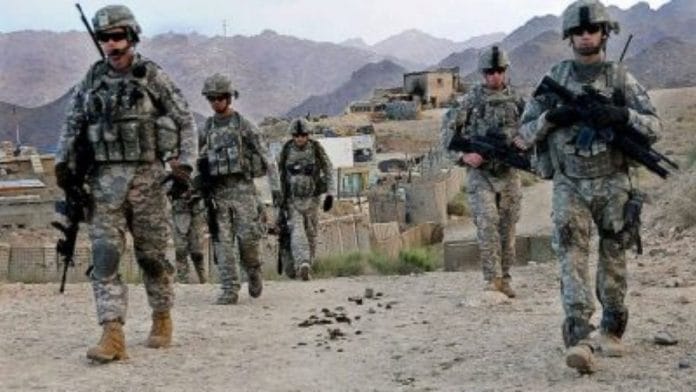
Thank you dear subscribers, we are overwhelmed with your response.
Your Turn is a unique section from ThePrint featuring points of view from its subscribers. If you are a subscriber, have a point of view, please send it to us. If not, do subscribe here: https://theprint.in/
We often hear presidents of the US saying, “May God bless the United States!”; “America is Great”; “Make America Great Again”. These slogans find place in every newspaper and bulletin of TV channels across the world, which is obvious because we are talking about the most powerful nation on this planet whose history has shaped the world of geopolitics. US presidential election is the most covered topic in global media. The US president is the most powerful person on earth. When the US president speaks, the whole world listens to him carefully and seriously. Decisions taken by the US president change the dynamics of global politics. US is the largest immigration country in the world. Definition of global security is incomplete without inculcating the moves of the world’s strongest military. Almost 20 per cent of world’s economic output is measured in US dollars and 80 per cent of global trade takes place in US dollars. The majority of the world’s currency reserves are held in US dollars. American greenback is the most sought-after currency in the world. Every sector of global industry has US companies at the top of the list – whether its banks, information technology, defence, space, aeronautics, or engineering.
We find it difficult to imagine the world without America, but here is a caveat; the world is back to the drawing board in search of global leadership, because America has lost its sheen and the appetite to lead the world in times of crisis. The US has lost its place as a world leader and created a deep void in global leadership. In global issues and crisis ranging from Iraq war to climate change to War on Terror in Afghanistan, the US failed to hold the sand in its palms, and it trickles through its hand very easily. America’s foreign policy lost its direction and chose the habit of making miscalculations while solving equations of geo-political mathematics, resulting in a series of disastrous events leading to a huge trust deficit and disbelief among US’ allies. The world’s oldest democracy has become a great cause of concern for almost every nation on this planet.
The historic decision of sudden pullout of US troops from Afghanistan has cast a shadow over America’s capacity and capability to maintain the tag of global leader. Former US President George W. Bush, who ordered the 2001 US-led invasion and began Operation Enduring Freedom on 7 October 2001 that drove the Taliban from power, had called for the reconstruction of Afghanistan on 17 April 2002. In November 2002, process began to establish a reconstruction model with the help of US. A Constitution for Afghanistan was adopted in January 2004 after which historic elections took place that led to Hamid Karzai becoming the first president of democratically elected head of Afghanistan. In May 2005, an agreement between the US and Afghanistan was signed declaring commitment to rebuild the country’s economy and political democracy. In 2009, President Obama introduced Af-Pak policy, linking success in Afghanistan with a stable Pakistan. On 1 May 2011, Osama Bin Laden was killed in Abbottabad, Pakistan in a major victory for US forces. In 2013, Afghan forces took the lead in security responsibility nationwide. The US-led coalition’s focus shifted to military training and special operation drove counterterrorism. In September 2014, Ashraf Ghani and Abdullah Abdullah formed a unity government. The facts clearly indicate that the US was the major architect of nation-building exercise in the last 20 years. So, when President Joe Biden says that, “US mission was never supposed to be nation-building. It was to prevent another terrorist attack on American soil”, then he clearly contradicts the US’ role in nation-building and establishing democracy in Afghanistan; though that efforts succeeded partially.
Afghanistan has covered a long distance, paving the way to laying the foundation of economic prosperity and development. Signs of improvement in human and economic indicators were visible. Literacy rate of women increased in the last 17 years; per capita income (in PPP terms) increased; more people have access to electricity than ever before; gross enrolment ratio of girls has increased to 104 per cent; internet penetration has deepened; more countries have established lines of trade with Afghanistan and the country has become an important part of Global Trade Environment. Whether it’s International North South Transport Corridor or access to Central Asia or Belt and Road initiative, Afghanistan has become a crucial link to international trade route. In this crucial phase, sudden and abrupt withdrawal of US troops from Afghanistan resulting in quick and speedy takeover of Afghanistan by Taliban has sent shockwaves across the world. Although the decision to withdraw is popular among majority of Americans, but a million-dollar question remains: “Who will take the guarantee that no other terrorist attack will be launched on American soil from Afghanistan?”
Also read: What happens in Kabul won’t stay in Kabul. US can get ready for challenge across Muslim world
These pieces are being published as they have been received – they have not been edited/fact-checked by ThePrint.


COMMENTS